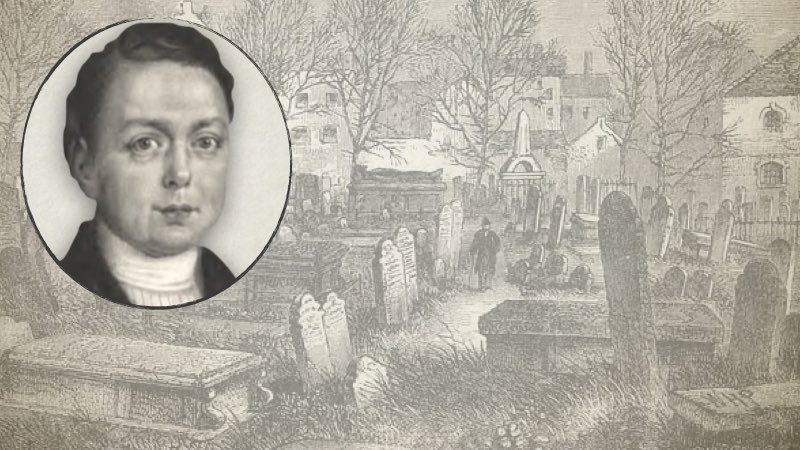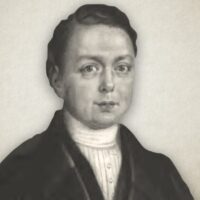
The Life And Death Of David Denham
J. A. Jones, “Bunhill Memorials”:
David Denham, Bapt. Sacred to the memory of the Rev. David Denham, minister of the gospel, who departed this life December 8th, 1848, aged 58 years.
Vault, with a Flat Stone, E. and W. 14,—N. and S. 1.
David Denham was a son of the above Thomas Denham, and was born April 12th, 1791. At the early age of eight years he was obliged to go out into the world as an errand boy, &c., and suffered great privations. He was afterwards placed apprentice to a glass cutter. When he was about eighteen years of age, he became a teacher in the Sunday School, belonging to the Rev. Rowland Hill’s Chapel, in Blackfriars Road. Subsequently, he was baptized, and commenced a preacher; first at Gainsford Street, Southwark, then at Horsell, in Surrey; from thence he removed to Reading, then to Bath: and after a while to Willow Street Chapel, Plymouth, where for a time he was exceedingly popular; insomuch that the preacher was frequently obliged to leave his pulpit, and place himself at the back of the front gallery, in order that the assembled crowds might hear him in the street, as well as the dense congregation which had assembled in the chapel. The place being too small, Mr. Denham removed with his people to a much larger chapel, where he continued to preach with much acceptance about seven years. His removal from Plymouth was principally occasioned by the secession from the Established Church of those monied men, Baring, Bevan, Snow, Kemp, and others. Most of them joined the Baptists, and many persons thought it a happy epoch in the history of Dissent; but, alas! they came forward to oppose our faith, and to disturb our societies. They fulminated the heresy of Sabellianism, denying the Deity and Distinct Personality of the Son and Spirit. Whole churches became swamped by their pernicious notions. A strong party in Mr. Denham’s church, adhered to Mr. Baring’s sentiments. The good man opposed them to the utmost, but the fire raged, and he was obliged to remove from Plymouth. After this he was for some time at Birmingham, and from thence to Margate. In the year 1834, he came to London, and became pastor of the Baptist Church at Unicorn Yard, Southwark, where he was several years. On his removal from London, he went to Oxford, and from thence to Cheltenham, and other places; but at length his ministerial powers seemed to have somewhat abated, so that though he was still acceptable, he did not again settle with any church. In the month of November, 1848, he went by invitation to preach at Yeovil, in Somersetshire. On the fourth Lord’s day (Nov. 26th,) being on his way to the place of worship, he complained of a pain in his head, and a sense of heaviness on his eyes. On his standing up in the pulpit to read, his voice seemed to be muffled; he leaned on his Bible, and then sat down. Being requested to leave the pulpit, and not attempt to preach, he said, “Well, I’ll try.” He opened the Bible, but gave out no text. He spoke a little, as far as his faltering voice permitted him. Such expressions as the following could be indistinctly heard, “How blessed to be brought to see the perfections of Jehovah harmonizing in the salvation of a sinner, and the Father embracing him through the blood and righteousness of Jesus!” He spoke only for a few minutes, pronounced the benediction in an intelligent manner; and was then conveyed home by the friends. He languished about twelve days; the feeble clay tabernacle appearing each day and hour to give way; yet his soul struggled to exalt, hold forth, and speak well of his Lord and Master. One person that was sitting by his bedside, says, “He woke up, and exclaimed, “My soul thirsts for God, yea for the living God. Christ is precious to me; exceedingly precious. His mercies are great!’” He remained quite unconscious of everything around him the whole of the day preceding his dissolution, and went home to glory between nine and ten o’clock on the morning of December 8th, 1848, in the 58th year of his age.
His remains were removed from Yeovil to London; and on the morning of Friday 15th, conveyed to Unicorn Yard Chapel, where he had formerly laboured. A large number of sorrowing friends, with his weeping family, were assembled. Mr. W. H. Bonner, the present pastor of the church there, delivered a suitable and most solemn address; and five other brethren in the ministry severally engaged. The procession then moved from thence to Bunhill Fields, in several mourning coaches, where his mortal remains were laid in a large brick vault on the left hand corner of that vast cemetery. Mr. Bowes, of Blandford Street, delivered the address with much holy solemnity; and on Lord’s day, December 24, Mr. Branch preached his funeral sermon at Waterloo Road Chapel, from Matthew 24:45, 46.
David Denham was a choice experimental preacher. His theme was “Jesus Christ and him crucified.” With this one blessed subject he began his ministry, and, without the least deviation, with this subject his labours were ended.
David Denham (1791-1848) was a Particular Baptist preacher. In 1834, he was appointed pastor of the church meeting at Unicorn Yard, Tooley Street, Southwark, London.




